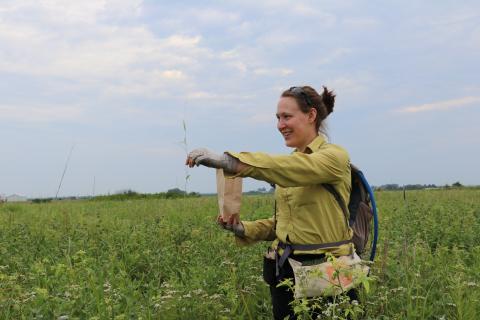Division Bids Farewell to Dr. Lauren Sullivan
Division Bids Farewell to Dr. Lauren Sullivan
Dr. Lauren Sullivan, who joined us as a faculty member in 2019, recently moved on to a new position at Michigan State University.
Dr. Sullivan is a plant ecologist interested in how the process of dispersal structures plant populations and communities in tallgrass prairies. Her work combines empirical and mathematical tools to understand how different global change factors like, habitat fragmentation, nutrient loading, and alterations to native herbivore communities cause changes in plant reproduction and dispersal and the resulting consequences of this movement for conservation and restoration ecology.
Dr. Sullivan’s time with department, though brief, was highly collaborative. She established several long-term collaborations, including a seed rain project as part of the USDA’s Central Mississippi River Basin Long-Term Agroecosystem Research Network; a seed bank project with Missouri’s Prairie Fork Conservation Research Program; a highway right-of-way pollinator project with the Missouri Department of Transportation; and a bison grazing project at the Midewin National Tallgrass Prairie in Illinois with the U.S. Forest Service. She also coordinated two international cooperative research networks: the Nutrient Network (NutNet) and the Disturbance and Resources Across Global Grasslands Network (DRAGNet). Her work at MU led to six publications, including a Nature paper, and close to $1 million in external funding.
Dr. Sullivan’s teaching career at Mizzou coincided with the COVID-19 pandemic. Her first major undergraduate teaching assignment, General Ecology, occurred in the fall 2020. Put in a situation where she had to completely overhaul this large-enrollment lecture and lab class, Dr. Sullivan used the circumstances to embrace the pedagogical priorities of active learning, inclusivity, student-to-student interactions, and scaffolding. Dr. Bethany Stone, who had an opportunity to observe Dr. Sullivan’s class in action, called her “a rare educator that pairs training and a natural ability in teaching with humility and a driving passion to improve.” This passion was appreciated by students, who also praised her energy and engagement in class, her “infectious enthusiasm” for ecology, and the connections she formed with them. As one former student shared, “She nurtured my passion and helped build my confidence as a researcher with her enthusiasm and continued support.” Another commented, “The enthusiasm Dr. Sullivan shows teaching ecology makes it hard not to enjoy her class.”
Dr. Sullivan also helped redesign and co-teach the Division’s Quantitative Methods in Life Sciences course together with Dr. Elizabeth King and Dr. Kevin Middleton. According to both, Dr. Sullivan “brought in new ideas in data science, a stronger focus on reproducible research, and the latest practices in data sharing.” They also credit her with increasing the inclusivity of the datasets used in class and choosing examples that highlight the diversity of researchers across the life sciences. Beyond the classroom, Dr. Sullivan was instrumental in leading and contributing to DataPhiles, an interdisciplinary community of scientists that meet to discuss the practical issues that arise in data analysis in the life sciences.
Dr. Sullivan mentored 4 PhD students, 2 Master’s students, 8 undergraduate research students, 1 postdoctoral fellow, and 2 research technicians and served on 18 graduate thesis/dissertation committees during her time with DBS. Her PhD student Zack Miller defended his dissertation this past summer, and her MA students, Carolyn Stephen and Maya Parker-Smith, will be graduating this fall. Two of her PhD students, Kathrynn Wynneand Marissa Zaricor, will be continuing their dissertation research with Dr. Sullivan at MSU, while Josh Klostermann transferred to a lab in MU’s Division of Plant Sciences. Dr. Sullivan served the broader graduate student population as a member of the department’s Graduate Education Committee.
Dr. Sullivan has been praised as an “insightful mentor” and lauded for creating a supportive mentoring environment that went well beyond her own lab group. As one graduate student shared, “The most outstanding quality that Dr. Sullivan exemplifies is her willingness to stand up for her students and make them feel included and heard.”
To many members of the Division, Lauren was much more than an outstanding scientist and exemplary teacher and mentor. She will be remembered for her cheerful, warm, fun, and energetic disposition and as a colleague who gives freely of her time, energy, advice, and expertise.
